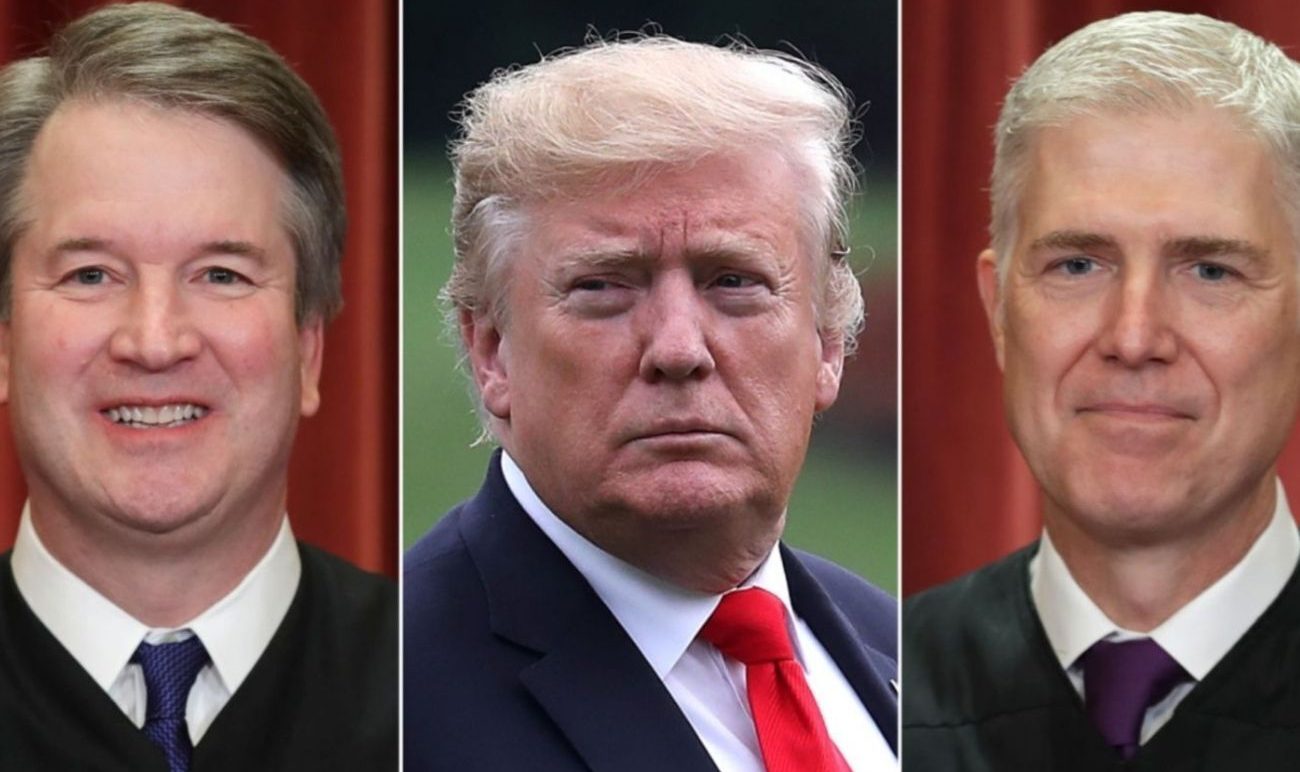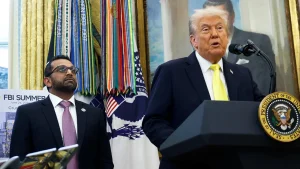In a landmark decision that could reshape U.S. immigration policy, the Supreme Court delivered a major victory to President Donald Trump’s administration, ruling that it has the authority to revoke Temporary Protected Status (TPS) for hundreds of thousands of migrants — a move supported by an unusually broad majority of justices across ideological lines.
The 8–1 decision overturned a lower court injunction that had blocked the administration from ending TPS protections for Venezuelan nationals, marking one of the most consequential immigration rulings of Trump’s second term.
Justice Ketanji Brown Jackson, appointed by President Joe Biden, was the lone dissenter.
A Rare Bipartisan Majority
The ruling saw both conservative and liberal justices align in favor of the administration, emphasizing the executive branch’s discretion over immigration and foreign policy.
“The Constitution and the Immigration and Nationality Act grant the executive branch broad authority to determine the terms of humanitarian protection,” the majority opinion stated. “Courts may not substitute their policy preferences for those of the elected branches in matters touching foreign relations.”
Legal analysts said the 8–1 vote reflects a strong institutional consensus on the limits of judicial interference in executive immigration policy.
“This is a sweeping affirmation of presidential power over immigration decisions,” said constitutional scholar Mark Levinson. “The fact that it’s 8–1 shows that even the liberal wing recognizes the need to defer to executive judgment in this area.”
Background: The Dispute Over Venezuela’s TPS Designation
Temporary Protected Status, or TPS, allows foreign nationals from countries facing crises — such as armed conflict or natural disasters — to live and work legally in the United States.
Venezuela was granted TPS in 2021 by then–Homeland Security Secretary Alejandro Mayorkas, who cited “extraordinary and temporary conditions” preventing safe return for Venezuelans fleeing political and economic turmoil under the regime of Nicolás Maduro.
That protection was extended multiple times through 2023 and early 2025, allowing approximately 300,000 Venezuelan migrants to remain in the U.S.
But in February 2025, newly appointed Homeland Security Secretary Kristi Noem rescinded Venezuela’s TPS status, arguing that conditions in the country had “stabilized” and that continued protection was “contrary to the national interest.”
Her memo, made public at the time, concluded:
“Following review of current conditions and consultation with U.S. agencies, Venezuela no longer satisfies the criteria for TPS designation. Allowing temporary presence for these nationals undermines the integrity of our immigration system.”
The decision drew immediate legal challenges from immigrant-rights groups and several Democratic-led states, which claimed the move was arbitrary and motivated by politics.
Lower Court Intervention — and Reversal
In March, U.S. District Judge Edward Chen of the Northern District of California issued an injunction halting Noem’s directive, ruling that the administration had failed to adequately justify the change.
Judge Chen further claimed that certain government filings “reflected unfounded stereotypes” about Venezuelan migrants, describing them as “replete with racial undertones.”
That decision temporarily restored TPS protections for tens of thousands of individuals, setting up a high-stakes appeal.
The Trump administration argued that the district court had overstepped its bounds. Solicitor General John Sauer told the Supreme Court last month that the Constitution grants the president and his appointees wide latitude in shaping immigration policy.
“The district court’s reasoning is untenable,” Sauer said. “Decisions about TPS designations involve uniquely sensitive judgments that belong to the Executive Branch.”
Supreme Court Sides With the Administration
The Supreme Court’s ruling now clears the way for the Department of Homeland Security to proceed with ending TPS for Venezuelans as early as next month.
Writing for the majority, Chief Justice John Roberts emphasized that immigration and foreign policy decisions are “inherently political questions” that fall within executive authority.
“While the humanitarian aims of the TPS program are vital,” Roberts wrote, “the judiciary cannot compel the continuation of a designation where the executive branch has lawfully determined that the statutory conditions are no longer met.”
The majority also noted that the district court’s injunction risked creating “a precedent of judicial policymaking” that could “inhibit future administrations of any party” from adjusting TPS programs based on evolving global conditions.
Justice Jackson, in her dissent, argued that the decision “unduly narrows judicial review” and warned that it could allow future administrations to terminate humanitarian protections without sufficient oversight.
“The Court today places the fate of hundreds of thousands of vulnerable individuals in the hands of executive discretion, with little recourse for review,” Jackson wrote.
Deportations and Policy Implications
The Department of Homeland Security says the decision immediately affects roughly 300,000 Venezuelan nationals currently living under TPS.
Officials confirmed that deportation proceedings could begin “within weeks,” though many are expected to seek alternative forms of relief or appeal removal orders.
According to DHS data released in late October, the Trump administration has already removed more than 527,000 migrants since January 20, 2025 — including 1.6 million voluntary departures out of roughly 2 million total.
A DHS spokesperson said the agency “anticipates those numbers will continue to rise” as additional resources are allocated to enforcement and border operations.
“We are prioritizing lawful removals under established guidelines,” the spokesperson said. “Individuals affected by the end of TPS will be processed in accordance with U.S. law and given access to appropriate legal channels.”
Reaction From Lawmakers
The ruling drew immediate reactions from both parties on Capitol Hill.
Republican lawmakers praised the decision as a long-overdue correction that restores executive authority and strengthens immigration enforcement.
“This is a major win for the rule of law,” said Sen. Josh Hawley (R-MO). “The Court rightly recognized that the president — not unelected judges — decides when a crisis no longer justifies temporary protection.”
Democrats, meanwhile, condemned the outcome as “inhumane,” warning that deportations could destabilize thousands of families who have built lives in the U.S.
“This decision abandons people who came here legally under humanitarian protection,” said Sen. Catherine Cortez Masto (D-NV). “Many of them have no home to return to.”
International and Humanitarian Reactions
The Venezuelan opposition in exile expressed concern over the ruling, saying that conditions under the Maduro regime remain unsafe for return.
Human Rights Watch called the decision “devastating,” urging the administration to implement a phased transition to prevent humanitarian fallout.
“TPS was never meant to be permanent,” said a DHS official familiar with the process, “but we will coordinate with international partners to ensure deportations are carried out responsibly.”
The Venezuelan government has not issued an official statement, though officials in Caracas previously said they would “accept returning citizens under normal immigration procedures.”
A Defining Immigration Moment
The Supreme Court’s decision could have broader implications beyond Venezuela. Legal experts say it effectively reaffirms the president’s unilateral power to end or extend TPS designations for other nations — including Haiti, Nicaragua, and El Salvador — without congressional approval.
The case also signals a renewed willingness among justices to defer to executive power in immigration matters, echoing similar rulings during Trump’s first term.
For the administration, the victory represents both a legal and symbolic milestone as it continues to pursue stricter immigration enforcement.
“The Supreme Court has made clear that immigration policy belongs to the president,” a senior administration official said Thursday. “That’s how the Constitution intended it.”
What Comes Next
The Department of Homeland Security is expected to issue updated guidance in the coming days outlining procedures for affected Venezuelan nationals, including voluntary departure options and humanitarian deferrals for individuals with medical or family-based considerations.
Advocates have vowed to continue pushing for legislative solutions, potentially reviving a stalled bipartisan proposal in Congress that would create a path to permanent residency for certain long-term TPS holders.
For now, the Trump administration appears poised to move quickly, viewing the Court’s decision as a mandate to enforce immigration law without delay.
“This is about restoring fairness and accountability,” Secretary Noem said in a brief statement. “The law is clear, and we intend to uphold it.”

James Jenkins is a celebrated Pulitzer Prize-winning author whose work has reshaped the way readers think about social justice and human rights in America. Raised in Atlanta, Georgia, James grew up in a community that instilled in him both resilience and a strong sense of responsibility toward others. After studying political science and creative writing at Howard University, he worked as a journalist covering civil rights issues before dedicating himself fully to fiction. His novels are known for their sharp, empathetic portraits of marginalized communities and for weaving personal stories with broader political realities. Jenkins’s breakout novel, Shadows of Freedom, won national acclaim for its unflinching look at systemic inequality, while his more recent works explore themes of identity, resilience, and the fight for dignity in the face of oppression. Beyond his novels, James is an active public speaker, lecturing at universities and participating in nonprofit initiatives that support literacy and community empowerment. He believes that storytelling is a way to preserve history and inspire change. When not writing, James enjoys jazz music, mentoring young writers, and traveling with his family to explore cultures and stories around the world.









